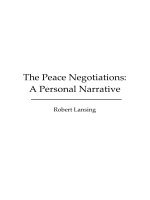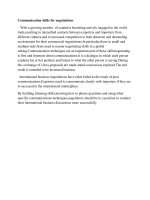Negotiations
Bạn đang xem bản rút gọn của tài liệu. Xem và tải ngay bản đầy đủ của tài liệu tại đây (105.93 KB, 20 trang )
Chapter 14: Negotiations
Overview
In a negotiation, he who cares less, wins.
[1]
The two of you can share a pie but only after agreeing on how to divide it. Often it’s clear
that players would benefit from collaborating, but it’s not obvious how the fruits of this
collaboration should be shared.
Consider a simple game where a seller owns a good that is worth $1000 to him but
$1300 to a buyer.
Value of Good to the Buyer = $1300
Value of Good to the Seller = $1000
We can make two inferences about negotiations between these parties:
Both parties have the potential to benefit from trade.
If the buyer acquires the good, he will pay between $1000 and $1300.
Parties can always benefit from trade when a potential buyer values the good more than
the potential seller does. Whenever you consider bargaining with someone, you should
first identify whether there are any possible gains from trade. If the good in our example
was worth less than $1000 to the buyer, then the parties should not bother negotiating.
Given that the buyer values the good more than the seller does, how much will it be
traded for? We can’t tell without more information. We can, however, use the values the
parties place on the good to determine its potential sale price range.
Since neither party will agree to an arrangement that makes him worse off, the seller will
never accept less than $1000, and the buyer won’t ever pay more than $1300. The
amounts of $1300 and $1000 represent the buyer’s and seller’s respective walking away
prices. Assuming that the two parties come to a deal, neither party will ever have to walk
away. What would have happened if a party had walked away, however, is critical in
determining the parties’ negotiating strength. Consequently, the party who cares least
about the negotiations succeeding has an advantage, for he would be hurt less by
walking away.
Armies frequently launch attacks just before starting peace talks.
[2]
Even if both sides
expect the peace talks to succeed, they still have massive incentives to carry out a
successful strike before the talks to increase their negotiating strength. Similarly, even if
you are certain you can negotiate some deal, you still should establish that you would do
well if the deal fell through.
[1]
Boone (1999), 113.
[2]
McMillan (1992), 49.
Take-It-or-Leave-It Offers
What would happen in our example if the seller could make a take-it-or-leave-it offer to
the buyer? If a take-it-or-leave-it offer is rejected, the game ends and the good isn’t
traded. If the seller could make such an offer, he should offer to sell the product for just
under $1300. Since the buyer values the good at $1300, he would be better off accepting
any offer less than $1300. As this example shows, a party who can make a take-it-or-
leave-it offer gets all the benefits of the trade.
To make an effective take-it-or-leave-it offer, you must make credible your threat to walk
away from negotiations if your initial offer is rejected. The threat to walk away, however,
often lacks credibility because both parties will still benefit from further negotiations if the
first offer is rejected. The best way to make credible take-it-or-leave-it offers is to
establish a record of having walked away from past negotiations.
“Boulwarism”is making a reasonable offer and then refusing to negotiate further.
[3]
The
term refers to Lemuel R. Boulware, a vice president at General Electric who developed a
strategy of never negotiating with unions. Boulware would make a single take-it-or-leave-
it offer to workers. By developing a pattern of making such offers, Boulware’s stance
gained credibility.
Imagine you’re negotiating a business deal that must be concluded within the next 24
hours, and you would like to propose a take-it-or-leave-it offer. You are certain that if
your prospective partner was forced to either (1) accept the offer or (2) walk away from
the deal, then she would accept. Unfortunately, you suspect that your prospective
partner will respond to your offer with a somewhat less favorable counteroffer. You can
make a take-it-or-leave-it offer only if you can credibly threaten never to consider any
other offers if yours is rejected. If your prospective partner believes that you really want
the deal to succeed, then she will also know that you would be unwilling to walk away
from her counteroffer. You could greatly improve your negotiating position by eliminating
the possibility of your ever hearing her counterproposal. You could, for example, mail her
an offer and then leave town for a vacation. By reducing your options. you would be
reducing hers. If you could not respond to a counteroffer, then your potential partner
would either have to either accept your offer or walk away.
[3]
Ibid., 56.
Bring Another Party to the Negotiations
Let's go back to our simple negotiating game between the buyer and seller. Assume that
now, however, there exists a second buyer who also values the good at $1300. Further
assume that the two buyers won't collude but rather will compete to buy the good from
the seller.
Value of the Good to Buyer 1 = $1300
Value of the Good to Buyer 2 = $1300
Value of the Good to the Seller = $1000
When we add a second seller, we can determine the exact sale price. Would it be
reasonable for buyer 1 to acquire the good for $1200? No, because this outcome is not
stable since buyer 2 would be willing to pay more than $1200 for the item. Thus, if the
two buyers compete, buyer 2 would never allow buyer 1 to acquire the good for only
$1200. Imagine that the three people are in a room negotiating. The negotiations couldn't
end with the seller agreeing to give the good to buyer 1 for $1200 because buyer 2
would offer to pay $1201 before he would ever leave the room empty-handed.
The only stable outcome in our three-person game is for the good to be sold for $1300.
The existence of the second buyer gives the seller all the potential profits from trade.
Both sellers need the buyer, whereas the buyer needs only one seller. Consequently, if
the seller can get the buyers to compete against each other, he can drive down their
profits to zero. Of course, if the buyers don't compete, then they would do much better.
Let's slightly change the game and assume that buyer 2 values the good at only $1250.
Value of the Good to Buyer 1 = $1300
Value of the Good to Buyer 2 = $1250
Value of the Good to the Seller = $1000
In this game buyer 1 will end up with the good because she would always outbid buyer 2.
The sale price will fall between $1250 and $1300. It's not a stable outcome for the good
to be sold for, say, $1230 because the buyer who didn't get the product would have been
willing to outbid her rival. It is stable for the good to be sold for somewhere between
$1250 and $1300 to buyer 1 because then buyer 2 wouldn't benefit from making a higher
counteroffer.
Imagine that you are the seller and you get a call from buyer 2 just a day before the start
of negotiations. Buyer 2 says that he isn't going to bother showing up since he knows he
will eventually be outbid by buyer 1. It's entirely rational for buyer 2 to stay home and not
waste his time in fruitless negotiations he is destined to lose. As the seller, however, you
should be horrified by the prospect of buyer 2 staying home. Without buyer 2, the price
will be somewhere between $1000 and $1300. With him, the range contracts to between
$1250 and $1300. Consequently, the seller should beg buyer 2 to show up, bribing him if
necessary.
[4]
Of course, buyer 1 should also be willing to bribe buyer 2 not to show.
Therefore, even though buyer 2 won't end up purchasing the good, he could still profit
from the negotiations.
In his negotiations with CBS, David Letterman exploited the tactic of increasing the
number of buyers. David Letterman hosts a late night comedy show for CBS, and his
contract was about to expire. CBS, reportedly, told the talk show host that he had no
other place to take his show if he didn't renew with CBS. David Letterman's show plays
best from about 11:30 to 12:30 p.m., during which time NBC runs the popular Tonight
Show and ABC runs the highly respected Nightline. ABC, however, indicated that it
would consider dumping Nightline and running Letterman's show instead. Although
Letterman ultimately renewed his contract with CBS, getting ABC to express interest in
him no doubt strengthened his bargaining position.
[4]
Brandenburger and Nalebuff (1996), 83-85.
Giving Up Control
Giving up control can also increase your negotiating strength.
[5]
If you prove that you are
not authorized to pay more than a certain amount, you may favorably contract the sale
price range. In our first example,
Value of Good to the Buyer = $1300
Value of Good to the Seller = $1000
The seller would benefit by, say, convincing the buyer that she couldn’t sell the item for
less than $1250. Of course, the buyer might suspect that the seller is lying to increase
her negotiating strength.
Giving up control to an agent who has a different objective than you can often enhance
your negotiating position.
[6]
Imagine that in the above game the buyer hires a
professional negotiator who has a reputation for either getting a great deal or walking
away from the negotiations. Although the buyer would be better off paying $1250 than
not getting the good, the agent would prefer to terminate negotiations than ruin his
reputation by getting a poor deal. If the seller knows about the agent’s reputation, then
the possible price range should shift in the buyer’s favor.
[5]
See McMillan (1992), 55.
[6]
Schelling (1960), 29.
Brinksmanship
[7]
A willingness to go to the brink may also strengthen your negotiating position.
Brinksmanship is best understood in the context of war.
India and Pakistan have long been enemies. India is much larger than Pakistan and has
a superior conventional army. In a conventional war between these rivals, India would
almost certainly win. A war between these nations might not stay conventional, however,
for Pakistan and India each have atomic weapons. Since both India and Pakistan would
be devastated by an atomic war, how much protection does Pakistan get from its own
atomic weapons?
A threat by Pakistan to attack India with atomic weapons if India invaded would not be
credible because India would surely respond in kind to any atomic aggression. Pakistan
would clearly be better off conquered by India’s army than decimated by its atomic
weapons. Consequently, a rational Pakistan would never deliberately use atomic
weapons if it thought that India wasn’t going to use them. Therefore, India would not
believe that Pakistan would deliberately use atomic weapons in response to a purely
conventional attack. So, how can Pakistan make its threat to use atomic weapons more
credible?
Perhaps it could have loose control over its weapons. Pakistan could give control of each
nuclear missile to a different general and put the missiles near the Indian border. Now,
imagine that India attacks and its troops fire directly on a general who has control of an
atomic weapon. Even if his leaders didn’t want him to push the button, the general, who
might be facing imminent death, would be tempted to use the atomics anyway.
By having weak control over its nuclear missiles, Pakistan would be employing
brinksmanship. Brinksmanship means deliberately taking a crisis to the brink of disaster.
If Pakistan had limited control over its nuclear missiles, then any conventional war
between Pakistan and India would risk becoming an atomic catastrophe. Brinksmanship
makes a threat far more credible, because when you are at the brink mistakes might
occur. By practicing nuclear brinksmanship, Pakistan could use its atomic weapons to
effectively deter India’s conventional army even if India assumes that Pakistan would
never deliberately use atomics.
Businesspeople, as well as military planners, can benefit from using brinksmanship. For
example, a party to a labor negotiation might create the risk of an “unwanted” strike to
increase his bargaining position.
[8]
Imagine that a union contract is about to expire, and it
would be devastating to both the company and union to not have a new contract. The
union, however, wants to threaten the company with a work stoppage. This threat
normally would lack credibility because a strike would harm the union. The union could,
however, use brinksmanship to enhance the threat’s credibility. For example, the union
could wait until the last minute to negotiate the contract so that failure might
automatically result in a strike.
The union could also openly condemn management so that its workers might vote
against an unfavorable contract even if the union’s leadership wanted to avoid a strike.
[9]
This tactic would combine giving up control with brinksmanship. By deliberately making it
difficult to accept a new contract, the union could enhance its negotiating position by
credibly signaling that it couldn’t accept a new agreement that didn’t significantly
increase employees’ salaries.
[7]
See Dixit and Nalebuff (1991), 292–295.
[8]
Ibid., 293–294.
[9]
Schelling (1960), 27.
Goals of Negotiations
When you are about to commence negotiations, always determine what you and your
potential partner would get if negotiations fail, for this determines the possible range of
settlement. During negotiations, consider what credible threats you could execute to
improve this range in your favor.
Auctions
In this chapter buyers and sellers engaged in unstructured negotiations. Chapter 15
explores a highly formal method by which to sell goods: auctions.









